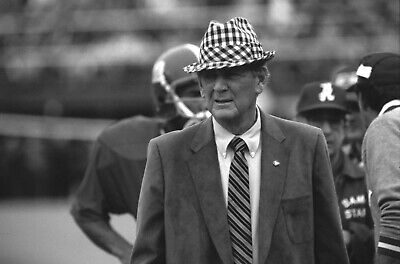Bear Bryant is widely regarded as one of the most legendary figures in the history of college football. Best known for his iconic run as the head coach of the University of Alabama’s football program, the Alabama Crimson Tide, he led the team from 1958 to 1982. Over the course of his remarkable 25-year tenure in Tuscaloosa, Bryant built a dynasty that reshaped the landscape of the sport and set a new standard for coaching excellence.
Bear Bryant is widely regarded as one of the most legendary figures in the history of college football. Best known for his iconic run as the head coach of the University of Alabama’s football program, the Alabama Crimson Tide, he led the team from 1958 to 1982. Over the course of his remarkable 25-year tenure in Tuscaloosa, Bryant built a dynasty that reshaped the landscape of the sport and set a new standard for coaching excellence. His time at Alabama was defined by relentless discipline, unwavering leadership, and an unmatched ability to mold young athletes into champions. Under his guidance, the Crimson Tide evolved into a powerhouse, claiming national titles, dominating the Southeastern Conference, and earning a reputation as one of the most feared and respected programs in the country. Bryant’s legacy remains deeply woven into the fabric of college football history, not only because of his victories but also because of the profound influence he had on the game and the countless lives he touched along the way.
Born Paul William Bryant in Moro Bottom, Arkansas, in 1913, he earned the nickname “Bear” as a teenager when he agreed to wrestle a carnival bear at a local fair. The nickname stuck, and so did the tough, gritty image that came to define his coaching philosophy. Bryant played college football at the University of Alabama under coach Frank Thomas, where he developed a deep love for the program and a thorough understanding of the game. After serving in the Navy during World War II, he embarked on his coaching career with assistant stints at various schools before taking head coaching positions at Maryland, Kentucky, and Texas A\&M.
At Texas A\&M, Bryant famously conducted his infamous “Junction Boys” training camp in 1954, a brutal conditioning period that tested the limits of his players and instilled a level of toughness that would become synonymous with his teams. That experience exemplified the core of Bryant’s approach: mental and physical toughness, discipline, and the drive to push beyond one’s perceived limits. It was that same approach he brought with him when he returned to his alma mater in 1958 to take over the Crimson Tide.
When Bryant arrived at Alabama, the program was in decline. The Tide had not enjoyed much success since the early part of the 20th century, and morale was low. Bryant promised to rebuild the program and famously declared, “Mama called, and when Mama calls, you just have to come running.” That quote reflected his love and loyalty to the university. He wasted no time turning things around. By his third season, Alabama had posted an undefeated regular season and captured a national championship in 1961, Bryant’s first at the school.
Over the next two decades, Alabama football under Bryant became synonymous with excellence. His teams won six national championships—1961, 1964, 1965, 1973, 1978, and 1979—and captured 13 SEC titles. His coaching record at Alabama stood at an astonishing 232–46–9. Overall, including his time at previous schools, Bryant retired with 323 career wins, making him the winningest coach in college football history at the time of his retirement. That milestone was not just a numerical feat; it was a testament to his adaptability, his innovation, and his mastery of motivating young athletes to perform at the highest level.
Bryant’s success was never rooted solely in X’s and O’s. While he was a tactical genius and knew how to adjust his schemes to suit the changing nature of the game, his real genius lay in his ability to lead. He was a master psychologist, knowing when to push a player, when to support him, and how to bring out the very best in each individual. He coached with a presence that demanded respect, and he earned loyalty from players who understood that his hard-nosed methods were always aimed at helping them succeed—not only on the field but in life.
Perhaps one of Bryant’s most important contributions to the sport came in the realm of integration. In the 1960s, as the civil rights movement swept across the South, college football programs in the region remained largely segregated. Bryant played a quiet yet pivotal role in integrating Alabama’s team. While he never made grand public statements about the issue, he understood that to compete at the national level, the team would need to welcome Black athletes. In 1971, he recruited Wilbur Jackson, the first Black scholarship player at Alabama. That same year, John Mitchell became the first Black player to take the field in a game. Bryant managed the transition with grace, minimizing backlash and ensuring a smooth integration that would set the stage for a more inclusive future at Alabama and across the SEC.
Bryant’s coaching tree is vast and impressive, with many of his former players and assistants going on to successful coaching careers of their own. His influence extended far beyond the bounds of Tuscaloosa, and his legacy shaped the next generation of college football leaders. He was revered not just in Alabama, but nationally, as a symbol of what college football could represent at its best: tradition, hard work, and a relentless pursuit of greatness.
Throughout his career, Bryant earned countless accolades. He was a three-time national coach of the year, and in 1983, the year following his retirement, he was awarded the Presidential Medal of Freedom, the highest civilian honor in the United States. That same year, the Paul “Bear” Bryant Museum was established on the University of Alabama campus, immortalizing his achievements and offering future generations a glimpse into the life and career of a coaching legend.
Bryant’s signature look—complete with houndstooth hat and rolled-up sleeves—became iconic. But it wasn’t the image that made him special. It was the respect he commanded, the loyalty he inspired, and the culture he built. Alabama football became a way of life, and under Bryant, the Crimson Tide fan base swelled with pride and passion that has persisted long after his passing.
When Bryant retired following the 1982 season, the football world paused to reflect on the end of an era. He had led Alabama to victory in the Liberty Bowl in his final game, capping a storied career with a win that, while relatively minor by his standards, still felt momentous. Less than a month later, on January 26, 1983, Bear Bryant passed away from a heart attack. His death stunned the sports world and triggered an outpouring of tributes from across the country. Over 300,000 people reportedly lined the streets of Birmingham for his funeral procession. The sheer magnitude of the response underscored the deep emotional connection he had forged with not just fans, but an entire culture.
In the years since his passing, Bryant’s legacy has only grown. His name remains synonymous with greatness, especially in Alabama, where his influence still echoes throughout the program. Every coach who has followed in his footsteps has operated under the weight of his shadow, and every national championship the Crimson Tide wins is inevitably compared to the standard he set. The houndstooth hat remains a cherished symbol in Tuscaloosa, worn by fans as a sign of respect for the man who elevated their team to greatness.
Bryant’s impact on the game is difficult to quantify fully, not because of a lack of data, but because his presence extended far beyond wins and losses. He mentored generations of players, many of whom credit him for helping them become the men they are today. He stood as a cultural icon during a time of great social and athletic transformation in the South. He brought dignity and class to a brutal, often cutthroat sport, and he never wavered in his dedication to his players, his school, and the game itself.
Today, college football is a multi-billion-dollar industry with massive media deals, playoff systems, and nonstop attention. While much has changed since Bryant roamed the sidelines, the essence of the sport—hard work, teamwork, and the pursuit of victory—remains rooted in the principles he championed. Bear Bryant didn’t just win games; he created a legacy of character, toughness, and resilience that continues to shape the sport.
Whether it’s through stories passed down from generation to generation, or through the countless players and coaches who carry forward his teachings, Bear Bryant’s spirit endures. He is more than a coach in the history books. He is a standard, a symbol, and a legend whose influence will never fade.



